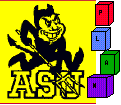So, you can create yourself an account using the following link
http://rakaposhi.eas.asu.edu/mediawiki/index.php?title=Special:UserLogin&returnto=Special:UserLogin
Then when you edit, login before editing.
Let's see how web3.0 you can get.
thanks
Rao
On Mon, Aug 31, 2009 at 7:56 PM, Subbarao Kambhampati <rao@asu.edu> wrote:
Folks:
I installed a mediawiki page for the class so you can collaboratively develop wikinotes for the class. There is a link to the wikinotes from the class page, but it is also available at
http://rakaposhi.eas.asu.edu/mediawiki/index.php/Cse571
Notice that currently, like wikipedia, anyone can edit pages. If we have software engineering and/or graphics students editing our notes, I will consider installing password permissions.
I assume you all are familiar with wikipedia page editing--mediawiki basically uses the same editor--very easy to use.
I setup a skeletal page for today's lecture and wrote a short summary of the observability issue in classical planning. Others can add anything they particularly remembered/understood.
cheers
Rao
